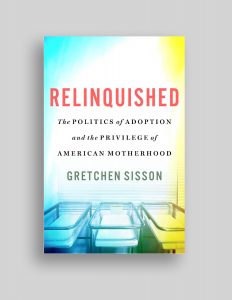Gretchen Sisson is the author of Relinquished: The Politics of Adoption and the Privilege of American Motherhood. She is a sociologist with Advancing New Standards in Reproductive Health in the department of obstetrics, gynecology, and reproductive sciences at the University of California, San Francisco, where she studies abortion and adoption in the United States. Her research was cited in the Supreme Court’s dissent in Dobbs v. Jackson Women’s Health Organization and has been covered in The Washington Post, The Nation, TIME Magazine, All Things Considered, New York Magazine, VOX, and other outlets. . Here, I ask her about her new book, Relinquished: The Politics of Adoption and the Privilege of American Motherhood which is out now from Gallery Books. You can connect with Gretchen on Instagram and Thread @gretchen.sisson and Twitter @gesisson
AMW: What myths are we told about adoption? What is the reality?
GS: In the United States, we have a lot of cultural ideas about adoption that are not rooted in the realities of those who are impacted.
First, we believe that we need more people to adopt babies. Within the context of private adoption, we have many, many more prospective parents who want to adopt than we have children available. While we don’t have good data on the number of prospective adoptive parents, the best estimates suggest there are up to 45 would-be adoptive families for every infant that is available. We have very, very high demand for children, and very low supply. Thus, you have agencies, attorneys, and other adoption facilitators (including for-profit brokers) that are motivated to find more babies that can be made available for adoption. We see this through aggressive targeted advertising and manipulative and coercive practices. So often adoption is not about finding families for children who need them, it’s about finding children for would-be parents who want them.
Second, we have the idea that people weight adoption against abortion when making a pregnancy decision. This frame has never really been true. Adoption is and always has been a very common reproductive experience: between 25-30% of American women will have an abortion at some point in their reproductive lives. Adoption relinquishment is rare: only about 0.7% of American women will ever relinquish an infant (and that estimate is likely high). We have plenty of data to show that 1) people who want abortions are uninterested in adoption, and 2) most women who relinquish infants for adoption did not want to have an abortion. Most relinquishing mothers preferred to parent, and only turned to adoption when they lack the support to do so. Even when women are denied access to abortion, over 90% will choose to parent, because they do not consider adoption to be a desirable option.
These specific misunderstandings feed general social myths about adoption as altruistic, as beautiful, and inevitably and enduringly good for the adopted person, as a necessary social good. The realities are far more complex and uncomfortable: adoption is a market-based system that commodifies children and is premised on inequality, that is – deeply – a reflection of whose parenthood we choose to value and support.
AMW: How is adoption a path of constrained choice for those for whom abortion is inaccessible?
GS: Of the mothers I interviewed, very, very few had adoption as their first choice when they found out they were pregnant. The majority of them wanted to parent their child, and they continued their pregnancies with that hope. However, they would come to a point in their pregnancy where parenting felt impossible: their partner left, or their own parents weren’t supportive, or they lost their housing, or they were too sick to continue working, or any number of setbacks that would push their (often already fragile) parenting plan to the point of untenability. Most relinquishing parents are in a hard place; in one larger-scale data collection, I found that 65% of relinquishing mothers had less than $5,000 in personal annual income, and most were already parenting other children. It doesn’t take much to derail their hopes to raise their child. (Even for those mothers who framed adoption as their first choice, they acknowledged that if they could have changed the other circumstances in their life: if they could have had more money or a better partner, for example, they would have parenthood. They didn’t inherently desire to relinquish their child, they just became resigned to their constraints very early on.)
For the minority who wanted to have an abortion, adoption became the lifeline when they either could not afford or could not legally access an abortion. As one participant said after being turned away from the abortion clinic: “adoption was the best and only option I had.” (As mentioned above, she was in the minority on this, too: most people denied abortion will parent.) But by stressing the “best and only” framing, it shows that adoption is an expression of having already been denied reproductive autonomy.
Thus, adoption is so often a reflection of constraint by virtue of resourceless or lack of control over broader circumstances – I found that it was most frequently a reflection of the failures of our social safety net, and our societal design to fail to care for people. The same challenges that make parenting difficult for so many millions of American parents made it impossible for this narrow subset.
AMW: What is the built-in contradiction that exists in the ideology of adoption?
GS: There are many cultural contradictions inherent in adoption: that adopting is altruistic, even within a system designed to privilege adoptive parents as consumers; that it’s an expression of reproductive choice, even as it’s rooted in violations of reproductive autonomy; that adoption is intrinsically good for adopted people, even though the system hold virtually no accountability to adoptees. However, one contradiction that I find most interesting is the ways in which relinquishing mothers are framed as unworthy as mothers until the relinquish. We judge mothers harshly for being poor or young, or, in more profound circumstances, for being mentally ill or addicted or incarcerated or homeless, even though we do not provide the opportunities for them to achieve stability, security, or well-being. Yet, by relinquishing their children, these mothers become heroic: they are selfless, brave, loving. In a way, they become the perfect mother. By relinquishing their child and their motherhood, they affirm themself as worthy as a mother, and are placed on a pedestal by those who believe the mythologies of what adoption can accomplish. As one of my participants said, “The more they say we’re heroes, the more I know they hate us.” The more soaring the rhetoric around the good of relinquishment, the more likely the orator would have been to condemn the same mother for wanting to raise her own child.
To me, all of these contradictions are examples of how our conversations about adoption are so often about politics, conservative values, the surveillance and policing or family, and the privileging of motherhood, rather than about how we find ways of supporting families and caring for children.
Alicia M. Walker is Associate Professor of Sociology at Missouri State University and the author of two previous books on infidelity. She is the current editor of the Council of Contemporary Families blog and serves as Senior Fellow with CCF. Learn more about her on her website. Follow her on Twitter at @AliciaMWalker1 and Instagram @aliciamwalkerphd



Comments